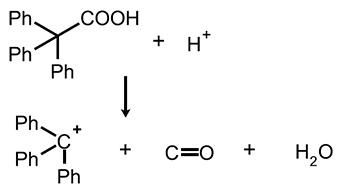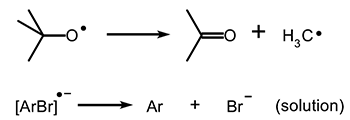ქიმიის ტერმინთა განმარტებითი ლექსიკონი
- ინგლისურ-ქართული
- ქართულ-ინგლისური
- ლექსიკონის შესახებ
- გამოხმაურება

| fragmentation | ფრაგმენტაცია |
where a-b is an electrofuge and X is a nucleofuge (which may emerge from the reaction in combined form), and the middle group affords the unsaturated fragment c=d. For example,
|
სადაც a-b არის ელექტროფუჯი და X არის ნუკლეოფუჯი (რომელიც შეიძლება გამოიყოს რეაქციის შედეგად კომბინირებული ფორმით), ხოლო შუა ჯგუფი იძლევა უჯერ ფრაგმენტს c=d. მაგალითად,
|
| See also: fragmentation reaction | ასევე იხილეთ: ფრაგმენტაციის რეაქცია |
| Source | წყარო: PAC, 1994, 66, 1077 (Glossary of terms used in physical organic chemistry (IUPAC Recommendations 1994)) on page 1116 |
|












